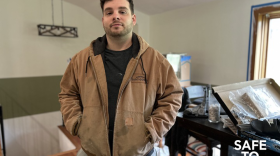The New Hampshire Supreme Court heard oral arguments Tuesday in a long-running case focused on contamination from PFAS chemicals emitted by manufacturing company Saint-Gobain.
PFAS are a group of man-made chemicals used by Saint-Gobain and other companies to make fire and chemical-resistant fabrics, among other products. The company has provided alternative drinking water to portions of New Hampshire that had their water supplies contaminated.
The case is a proposed class action suit for residents exposed to PFAS contamination near Saint-Gobain’s Merrimack facility. Among other things, residents who say they’ve been exposed to toxic chemicals that contaminated their water are hoping the company will pay for medical monitoring for illnesses related to PFAS exposure, like certain cancers.
The case has been moving through New Hampshire District Court since 2016. But courts in the United States have been split on the issue of medical monitoring, so New Hampshire’s Supreme Court is being asked to weigh in on whether the state recognizes claims for medical monitoring as a remedy for people who were exposed to toxic substances.
They have also been asked to address whether those people must prove they have a present injury from the toxins, or if they can seek medical monitoring without a present injury.
Kevin Hannon, a lawyer for residents exposed to the contamination, argued it’s unfair for individuals or their insurance providers to pay for the company’s negligence. He said medical monitoring could be a remedy.
“Early diagnosis improves the prospects for treatment, prolongs life, minimizes pain and disability, and mitigates the harm of toxic exposure,” he said. “Mitigation is something the law promotes.”
In a brief filed ahead of the oral arguments, lawyers for the plaintiffs also argued that the exposure to toxins and the increased risk of illness that creates a medically necessary need for testing is itself an injury, eligible for compensation.
The lawyers compare allowing residents to recover the costs of medical testing for diseases related to PFAS exposure to allowing a victim of a car crash to recover the cost of an X-ray.
Bruce Felmly, a lawyer for Saint-Gobain, argued that allowing claims for medical monitoring without a present physical injury would deviate from 200 years of common law in New Hampshire.
“This is a dramatic change,” he said. “To say you do not have to demonstrate physical manifestation from this exposure.”
When one justice asked how the situation involving Saint-Gobain differs from an individual in a car accident, Felmly said the presence of cuts and bruises in the latter case show a present injury.
Felmly also argued medical monitoring would cost the company a lot of money and would give New Hampshire courts more work. He also said only a few people would benefit from the long-term testing.
“This is the poster child for a medical monitoring case that is unworkable, impractical, inconsistent with New Hampshire law, staggeringly expensive – for what? To yield every some number of decades one additional case,” he said.
Andrea Amico, a longstanding advocate for communities in New Hampshire exposed to PFAS contamination and the founder of Testing for Pease, attended the oral arguments. She said she was glad the issue was in front of the state’s Supreme Court.
“I think the polluters responsible should take accountability for contaminating communities without their consent,” she told NHPR. “Unfortunately, they haven't done that.”







